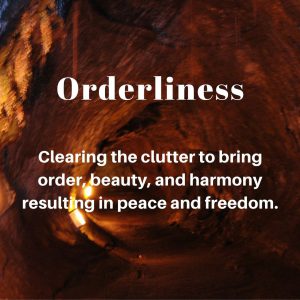
Orderliness

Description
Orderliness is living in a way that creates harmony around us and within us. We have a place for the things we use, and keep them where they belong. Order and beauty in our home and work spaces brings a sense of peace and freedom. Our thoughts and ideas flow more freely. We do not hold onto clutter. We clear the way for genuine abundanance. Orderliness is being focused and purposeful, planning tasks step by step instead of going in circles. As we trust Divine order unfolding in our lives, we find a still point of order in our souls.
Quote
“What a gift of grace to be able to take the chaos from within and from it create some semblance of order”
— Katherine Paterson
The Practice of Orderliness
- I create a harmonious space that makes my soul peaceful.
- I keep only what is useful and beautiful.
- I put things in their place after I use them.
- I plan with a purpose.
- I solve problems step by step.
- I trust in the presence of Divine order in my life.
Definitions and practices of virtue are used with permission from the Virtues Project™.
In Family Life
A harmonious and organized living environment manifests the virtue of orderliness within a family. It entails maintaining a clean and tidy home where each family member takes responsibility for their personal space and collectively contributes to shared spaces. Orderliness is demonstrated by adhering to schedules and routines, ensuring that mealtimes, chores, and activities are planned and executed efficiently.
It also involves effective communication and a sense of shared responsibility, with everyone playing their part in keeping the household running smoothly. Ultimately, orderliness in a family fosters a sense of tranquility, cooperation, and respect among its members, creating a nurturing and stable foundation for growth and well-being.
Balancing Orderliness
Orderliness, when not in balance, can manifest as perfectionism or chaos. Consider these companion virtues to maintain a healthy balance.
- Flexibility: Flexibility helps prevent the overdevelopment of orderliness by allowing you to adapt to unexpected changes and enjoy spontaneity. It’s the ability to go with the flow when necessary.
- Compassion: Compassion reminds us not to judge ourselves or others harshly when orderliness is underdeveloped. Instead of berating ourselves for a messy room or a missed deadline, we can show understanding and kindness.
- Wisdom: Wisdom helps us discern when to apply order and when to let go. It enables us to prioritize tasks and recognize that perfection is not always attainable or necessary.
- Courage: Courage encourages us to step out of our comfort zone, even if it means deviating from our meticulously organized plans. It helps break free from the constraints of overdeveloped orderliness.
- Self-discipline: Self-discipline complements orderliness by providing the structure needed to achieve goals, but it does so in a balanced and sustainable manner, preventing the burnout associated with perfectionism.
- Humility: Humility reminds us that nobody is perfect and everyone makes mistakes. Embracing imperfection and learning from it is key to maintaining a healthy relationship with orderliness.
Orderliness is a virtue that, when kept in balance with other virtues like flexibility, compassion, wisdom, courage, self-discipline, and humility, can lead to a well-structured and harmonious life.
